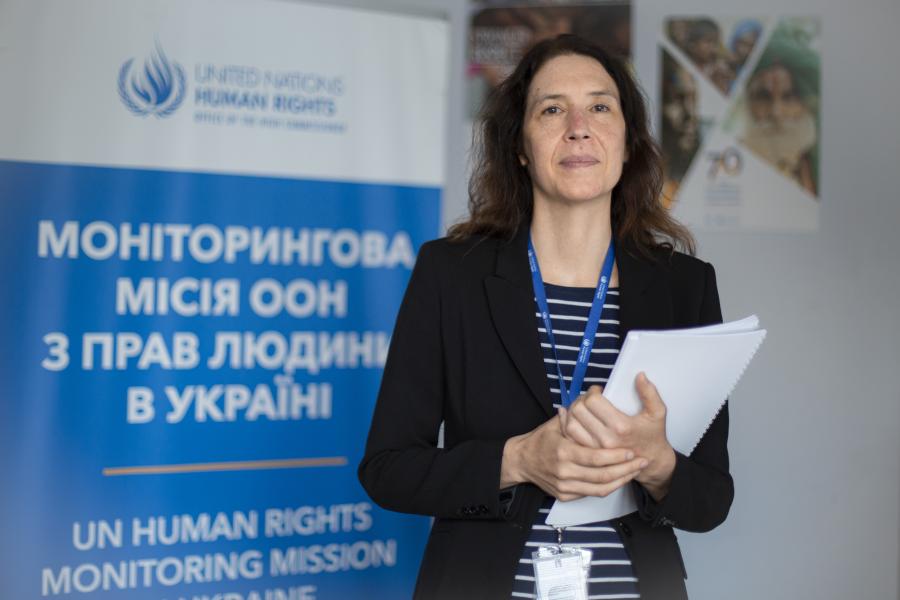COVID-19 pandemic has further exacerbated hardships and discrimination faced by people in Ukraine, says UN Human Rights
17 December 2020
- A new UN report shows how the COVID-19 pandemic and response measures aggravated human rights concerns in Ukraine, particularly for those who already faced discrimination and exclusion before the pandemic. Paying particular attention to the impact on economic and social rights, the report highlights how the pandemic has affected the rights of groups in vulnerable situations. It covers the period from 20 February 2020 to 6 December 2020 and is based on the work of the UN Human Rights Monitoring Mission in Ukraine (HRMMU).
“The closure of entry-exit crossing points in eastern Ukraine has resulted in the separation of families, and the loss of already limited access to healthcare, education, pensions and sources of income for people living there”, said Matilda Bogner, Head of the HRMMU.
The monthly average number of crossings through the contact line in eastern Ukraine decreased from 1.1 million in 2019, to less than three hundred as a consequence of the closure of all five entry-exit crossing points from late March to late June 2020. Although crossings of the contact line have increased since June, their levels remain low, especially in Donetsk region, due to restrictions.
In relation to the Autonomous Republic of Crimea and the city of Sevastopol, Ukraine, temporarily occupied by the Russian Federation (Crimea), the report highlights that restrictions on freedom of movement introduced by the Governments of Ukraine and the Russian Federation have also significantly affected people’s access to work, education, healthcare, property and family links.
“While some of the restrictions might be necessary to prevent the spread of the virus, where persons need to cross on humanitarian grounds, all parties must ensure that freedom of movement is respected, and that crossings of the contact line and ABL are quick, safe and dignified,” said Bogner.

The report also states that people in detention are particularly vulnerable to COVID-19, as some detention facilities are overcrowded and cannot fully comply with prevention measures such as physical distancing. In Government-controlled territory, the number of cases amongst penitentiary staff grew rapidly in October and November, increasing the risk of infection among detainees and prisoners. While no reliable figures regarding COVID-19 cases in detention are available in territory controlled by self-proclaimed ‘Donetsk people’s republic’, self-proclaimed ‘Luhansk people’s republic’ and in Crimea, persons in detention there reportedly lacked personal protective equipment and access to adequate healthcare.
Access to justice and the right to a public trial were also affected by COVID-19-related restrictions, with some courts prohibiting observers and journalists access to their premises.
The report also highlights incidents of hate speech and discriminatory acts towards different groups, including persons potentially infected by the COVID-19, LGBTI, Roma, homeless persons and healthcare workers, as a direct or indirect consequence of the pandemic. It further documented the involvement of public authorities in hate speech incidents, in clear breach of their human rights obligations.
The report highlights the COVID-19 impact on frontline healthcare workers who must deal with heavy workloads while facing issues such as the lack of healthy and safe working conditions, fair remuneration and mental health support services.
“Conditions of work of all healthcare workers must be improved. Female and male healthcare workers need to receive decent pay, safe and healthy conditions of work, and compensation for work related illnesses and injuries, including for COVID-19,” Bogner added.
The report emphasizes that response measures should ensure that no one is left behind, particularly those from vulnerable groups who were already facing discrimination.
“People in vulnerable situations, like Roma, persons with disabilities, older persons and persons living in homelessness, and particularly women and girls within these groups, faced even more limited enjoyment of the rights to health, work, education and an adequate standard of living since the outbreak of the COVID-19 pandemic”, she said.
It concludes with targeted recommendations, both short-term and long-term, to the Government and other actors to remove existing barriers and combat discrimination. The Government should also consult representatives of groups at risk and civil society while designing and implementing COVID-19 responses and socio-economic recovery measures.
“We know that further human rights concerns are expected to emerge, as the number of infections in Ukraine continues to rise and the impact of the pandemic is constantly evolving. Placing human rights up front and centre provides a roadmap to ensure we leave no one behind and recover better, creating a more resilient society”, Bogner concluded.
The report is available here — https://www.ohchr.org/Documents/Countries/UA/Ukraine_COVID-19_HR_impact_UA.pdf https://www.ohchr.org/Documents/Countries/UA/Ukraine_COVID-19_HR_impact_EN.pdf https://www.ohchr.org/Documents/Countries/UA/Ukraine_COVID-19_HR_impact_RU.pdf



